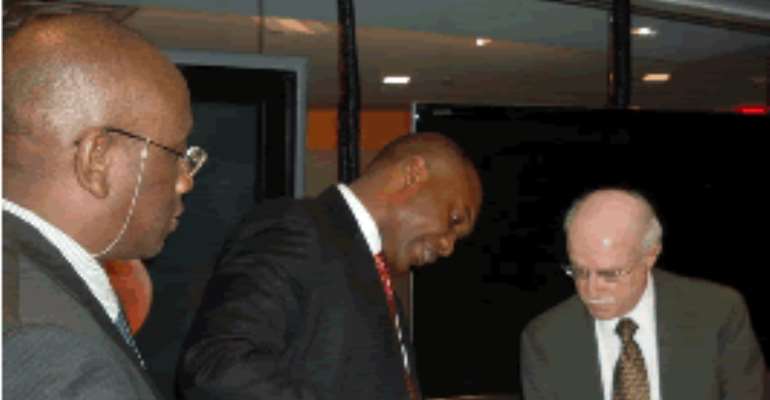CHIDOKA IN US, SEEKS FRESH STRATEGIES ON SEATBELT

•L-R Deputy Corps Marshal, Operations, FRSC, Boboye Oyeyemi; Chidoka, and Mr Carra during the 90th Transport Research Board Meeting in Washington DC, USA, last week.
The Corps Marshal and Chief Executive of the Federal Road Safety Corps (FRSC) Osita Chidoka, has advocated the need to design sustainable strategies on the use of seat-belt, teen drivers and pedestrians as part of measures towards safer road use within the global community.
Speaking during a working visit at the National Highway Safety Administration, Washington DC, United States, the Corps Marshal expressed concern over the endangered status of children, teen drivers and pedestrians whose exposure to traffic hazards has no doubt, has contributed tremendously to road traffic injuries and fatalities.
He further sought for technical partnership in the area of research, sharing of data on drivers and vehicle license, human capacity development and training exchange programmes.
Responding, the Acting Director for Public Rule of the National Highway Traffic Safety Administration, Mr. Joseph Carra, commended the FRSC for its remarkable achievements as lead agency in traffic administration and safety management in Nigeria and pledged to partner with the Corps to enhance its job functions.
Specific follow up actions were also taken especially in the area of FRSC staff under studying the National Driver Register and Traffic Record Division of the National Centre for Statistics and Analysis and the Transportation Safety Institute in America in the process of drivers license data management.
In a related development, the FRSC Corps Marshal has sought the collaboration of the National Transportation and Safety Board, America in the area of highway crash investigation and technical exchange programmes.
Making a presentation to the Vice Chairman of the National Transportation and Safety Board, Honorable Christopher Hart, the Corps Marshal recalled that the FRSC has set up a road accident investigation Unit with seven teams consisting of five members trained by the North Western University of Carolina in 2009 in road crash investigation with emphasis on the socio-economic impact of road crashes on national development.
Speaking earlier, the Vice Chairman stated that the Board is an independent agency which investigates accidents in all modes of transportation in order to determine probable causes and make recommendations on preventive measures. Though analysis of the Board's investigations are not admissible in any litigation process, Honorable Hart added that the agency has made tremendous success in the areas of child restraint standards, graduated driver licensing laws and improved highway signs.
In a similar meeting at the Transport Division office of the World Bank, the Corps Marshal also presented a progress report on the safe corridor project as sponsored by the World Bank on Nigerian highways which includes World Bank approval of procurement process for the designated corridors, advertisement of national competitive bidding and documentation of international competitive bidding for patrol vehicles, ambulances and tow trucks.
The Corps Marshal's report also incorporated the United Nations Decade of Action on road traffic crash, establishment of a Planning Advisory Unit to undertake business intelligence functions, training needs assessment by creative human resources and country capacity review on road traffic administration and safety management in Nigeria, conducted by the Integrated Transport Planning Limited under the auspices of the Global Road Safety Facility of the World Bank.
